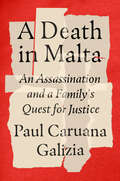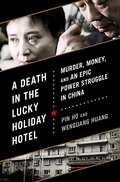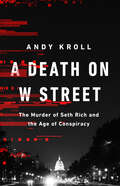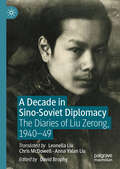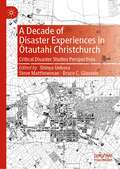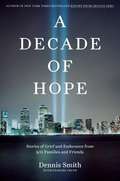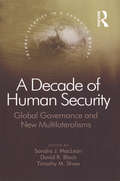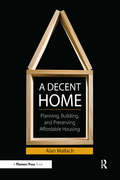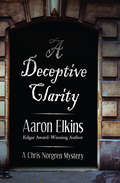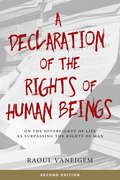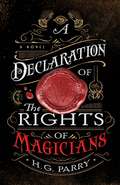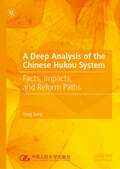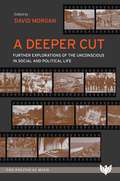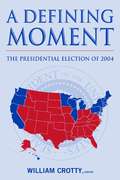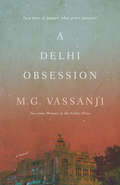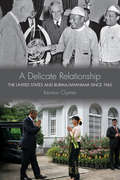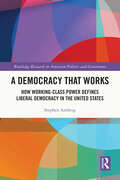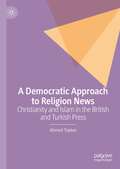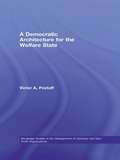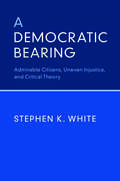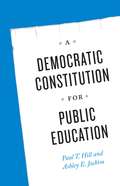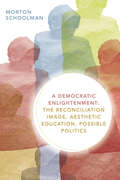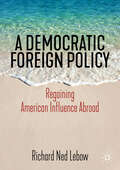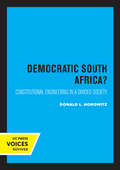- Table View
- List View
A Death in Malta: An Assassination and a Family's Quest for Justice
by Paul Caruana Galizia&“A chronicle of the sort of silencing-by-murder that we might have thought happens only in Vladimir Putin&’s Russia. . . . [and] a son&’s distraught but beautiful tribute to his journalist-mother. . . . Exquisite.&” —Wall Street JournalA journalist&’s spellbinding account of the shocking murder of his muckraking mother and a quest for justice that has reverberated far beyond their tiny homelandAn archipelago off the southern coast of Italy, Malta is a picturesque gem eroded by a climate of corruption, polarization, inequality, and a virtual absence of civic spirit. In this unpromising soil, a fearless journalist took root. Daphne Caruana Galizia fashioned herself into the country&’s lonely voice of conscience, her muckraking and editorializing sending shock waves that threatened to topple those in power and made her at once the island&’s best-known figure and its most reviled. In 2017, a campaign of intimidation against her culminated in a car bombing that took her life. Daphne was also he devoted and inspiring mother to three sons, who with their father have carried on the quest for justice and transparency after her death. Spellbindingly narrated by the youngest of them, the award-winning journalist Paul Caruana Galizia, A Death in Malta is at once a study in heroism and the powerful story of a family&’s crusade for accountability in a society built on lies, with reverberations far beyond their homeland.
A Death in the Lucky Holiday Hotel: Murder, Money, and an Epic Power Struggle in China
by Wenguang Huang Pin HoThe downfall of Bo Xilai in China was more than a darkly thrilling mystery. It revealed a cataclysmic internal power struggle between Communist Party factions, one that reached all the way to China's new president Xi Jinping.The scandalous story of the corruption of the Bo Xilai family-the murder of British businessman Neil Heywood; Bo's secret lovers; the secret maneuverings of Bo's supporters; the hasty trial and sentencing of Gu Kailai, Bo's wife-was just the first rumble of a seismic power struggle that continues to rock the very foundation of China's all-powerful Communist Party. By the time it is over, the machinations in Beijing and throughout the country that began with Bo's fall could affect China's economic development and disrupt the world's political and economic order.Pin Ho and Wenguang Huang have pieced together the details of this fascinating political drama from firsthand reporting and an unrivaled array of sources, some very high in the Chinese government. This was the first scandal in China to play out in the international media-details were leaked, sometimes invented, to non-Chinese news outlets as part of the power plays that rippled through the government. The attempt to manipulate the Western media, especially, was a fundamental dimension to the story, and one that affected some of the early reporting. A Death in the Lucky Holiday Hotel returns to the scene of the crime and shows not only what happened in Room 1605 but how the threat of the story was every bit as important in the life and death struggle for power that followed. It touched celebrities and billionaires and redrew the cast of the new leadership of the Communist Party. The ghost of Neil Heywood haunts China to this day.
A Death on W Street: The Murder of Seth Rich and the Age of Conspiracy
by Andy KrollNamed one of Mother Jones' BOOKS WE NEEDED IN 2022 Named one of CrimeReads' BEST NEW TRUE CRIME BOOKS OUT NOW A true-crime story for the post-truth era In the early hours of July 10, 2016, gunshots rang out and a young man lay fatally wounded on a quiet Washington, DC, street. But who killed Seth Rich? When he was buried in his hometown, his rabbi declared: &“There are no answers for a young man gunned down in the prime of his life.&” The rabbi was wrong. There were in fact many answers, way too many. In the absence of an arrest, a howling mob filled the void. Wild speculation and fantastical theories surfaced on social media and gained traction thanks to a high-level cast of provocateurs. But it wasn&’t until Fox News took the rumors from the fringes to the mainstream that Seth Rich&’s life and death grew into something altogether unexpected—one of the foundational conspiracy theories of modern times.A Death on W Street unravels this gripping saga of murder, madness, and political chicanery, one that would ensnare Hillary Clinton and Steve Bannon, a popular pizzeria in northwest DC and the most powerful voices in American media. It's the story of an idealistic twenty-seven-year-old political staffer who became a tragic victim of the culture wars, until his family decided that they had no choice but to defend his name and put an end to the cruel deceptions that surrounded his death. This is the definitive story of Seth Rich, of those who tried to weaponize his memory in a war of words unlike any other, and of one family&’s crusade to protect the truth against all odds.
A Decade in Sino-Soviet Diplomacy: The Diaries of Liu Zerong, 1940–49
by David BrophyThis book will illuminate Xinjiang studies as never before, publishing for the first time the complete diaries of Liu Zerong, governor of Xinjiang during World War II, illuminating the origin of contemporary policies for smaller ethnic groups in the new China that emerged in 1949. The diaries are introduced with a biographical study of Liu, and a discussion of the historical context of World War II and the post-war situation in Xinjiang, which was divided into rival spheres of KMT control, and the Soviet-aligned East Turkistan Republic. Both in the Moscow embassy, and in the provincial administration of Ürümchi, Liu Zerong was Republican China’s chief Russian-speaking representative, whose task it was to engage on a daily basis with his Soviet counterparts. His extensive diaries therefore offer a unique insight into this tense decade of Sino-Soviet diplomacy, and will be of interest to a wide range of scholars in fields of Chinese and international history. The accompanying set of essays by the world's leading Xinjiang scholars confirm this volume's status as a key text for scholars, policymakers and others seeking to understand Chinese policies in Xinjiang.
A Decade of Disaster Experiences in Ōtautahi Christchurch: Critical Disaster Studies Perspectives
by Bruce C. Glavovic Steve Matthewman Shinya UekusaThis book critically surveys a decade of disasters in Ōtautahi Christchurch. It brings together a diverse range of authors, disciplinary approaches and topics, to reckon with the events that commenced with the 2010-2011 Canterbury earthquake sequence. Each contribution tackles its subject matter through the frame of Critical Disaster Studies (CDS). The events and the subsequent recovery provide a once-in-a-lifetime opportunity to learn from a series of concatenating urban disasters in order to prepare us for our future on an urban planet facing unprecedented environmental pressures. The book focuses on the production of vulnerability, the human dimensions of disaster, the Indigenous response to disasters and the practical lessons that can be drawn from them.
A Decade of Hope
by Dennis Smith Dierdre SmithOn the tenth anniversary of 9/11, a portrait of tragedy, survival, and healing from the author of The New York Times bestseller Report from Ground Zero. <P><P>This year marks the tenth anniversary of the attacks on the World Trade Center and the Pentagon, an occasion that is sure to be observed around the world. But among the memorials, political speeches, and news editorials, the most pressing consideration- and often the most overlooked-is the lives and well-being of the 9/11 first responders, their families, and the victims' families over the past decade. Dennis Smith, a former firefighter and the author of the bestselling Report from Ground Zero, addresses this important topic in a series of interviews with the heroes and families of those most affected by the tragedy either through feats of bravery in the rescue efforts or heroic bearing up in the face of unimaginable loss. Smith provides an intimate look at a terrible moment in history and its challenging and difficult aftermath, allowing these survivors to share their stories of loss, endurance, and resilience in their own words. A Decade of Hope is an honest and vitally important look at a decade in the lives of those for whom a national tragedy was a devastatingly personal ordeal. .
A Decade of Human Security: Global Governance and New Multilateralisms (Global Security in a Changing World)
by David R. BlackHuman security has been advanced as an alternative to traditional state-based conceptualizations of security, yet controversies about the use and abuse of the concept remain. Investigating innovations in the advancement of the human security agenda over the past decade, this book identifies themes and processes around which consensus for future policy action might be built. It considers the ongoing debates regarding the human security agenda, explores prospects and projects for the advancement of human security, addresses issues of human security as emerging forms of new multilateralisms and examines claims that human security is being undermined by US unilateralisms. This comprehensive volume explores the theoretical debate surrounding human security and details the implications for practical application. It will prove ideal for students of international relations, security studies and development studies.
A Decade of Upheaval: The Cultural Revolution in Rural China (Princeton Studies in Contemporary China #12)
by Andrew G. Walder Dong GuoqiangA revealing exploration of political disruption and violence in a rural Chinese county during the Cultural RevolutionA Decade of Upheaval chronicles the surprising and dramatic political conflicts of a rural Chinese county over the course of the Cultural Revolution. Drawing on an unprecedented range of sources—including work diaries, interviews, internal party documents, and military directives—Dong Guoqiang and Andrew Walder uncover a previously unimagined level of strife in the countryside that began with the Red Guard Movement in 1966 and continued unabated until the death of Mao Zedong in 1976.Showing how the upheavals of the Cultural Revolution were not limited to urban areas, but reached far into isolated rural regions, Dong and Walder reveal that the intervention of military forces in 1967 encouraged factional divisions in Feng County because different branches of China’s armed forces took various sides in local disputes. The authors also lay bare how the fortunes of local political groups were closely tethered to unpredictable shifts in the decisions of government authorities in Beijing. Eventually, a backlash against suppression and victimization grew in the early 1970s and resulted in active protests, which presaged the settling of scores against radical Maoism.A meticulous look at how one overlooked region experienced the Cultural Revolution, A Decade of Upheaval illuminates the all-encompassing nature of one of the most unstable periods in modern Chinese history.
A Decent Home: Planning, Building, and Preserving Affordable Housing
by Alan MallachWhat is a decent home? Does it simply provide shelter from the elements? Is it affordable enough that you can buy the other necessities of life? Does it connect you to a community with adequate social and economic resources? Noted housing expert Alan Mallach turns his decades of experience to these questions in "A Decent Home". Mallach's nuanced analysis of housing issues critical to communities across the country will help planners evaluate the housing situation in their own communities and formulate specific plans to address a variety of housing problems. The book is both a practical step-by-step guide to developing affordable housing and a sophisticated introduction to housing policy. Chapters address design, site selection, project approval, financing, and the history of housing policy in the United States. Planners will find useful information about inclusionary and exclusionary zoning, affordable housing preservation, and the risks and rewards of affordable-home-ownership programs. Mallach also connects the dots among regional economic competitiveness, quality of life, community revitalization, and affordable housing.
A Deceptive Clarity: Book One) (The Chris Norgren Mysteries #1)
by Aaron ElkinsAn American museum curator in Berlin must find a fake painting—and a real killer—in this mystery from the Edgar Award–winning author of Switcheroo. Chris Norgren, museum curator and Renaissance art expert, heads to Berlin to assist in mounting a sensational exhibit: The Plundered Past—twenty priceless Old Masters looted by the Nazis, thought for decades to be lost forever, and only recently rediscovered. But things quickly get out of hand when Chris&’s patrician, fastidious boss, after sensing a forgery in the lot, turns up dead the very next day—on the steps of a dismal Frankfurt brothel, of all places. Now, Chris faces a daunting task: finding a counterfeit artwork among the masterpieces—and an all-too-real killer whose sights are now set on him. A Deceptive Clarity is the first in the Chris Norgren Mysteries by the multiple award–winning creator of the Gideon Oliver &“Skeleton Detective&” novels—a celebrated master who &“thoroughly understands the art of the murder mystery&” (The Philadelphia Inquirer).
A Declaration of the Rights of Human Beings: On the Sovereignty of Life as Surpassing the Rights of Man
by Liz Heron Raoul VaneigemSometimes playful or poetic, always provocative, Raoul Vaneigem reviews the history of bills of rights before offering his own call, with commentary, for fifty-seven rights yet to be won in a world where the “freedoms accorded to Man” are no longer merely “the freedoms accorded by man to the economy.” Readers of Vaneigem’s now-classic work The Revolution of Everyday Life, which as one of the main contributions of the Situationist International was a harbinger of May 1968 in France, will find much to savor in these pages written in the highest idiom of subversive utopianism.
A Declaration of the Rights of Magicians: The Shadow Histories, Book One (The\shadow Histories Ser. #1)
by H. G. Parry'A rich, sprawling epic full of history and magic.' Alix E. Harrow, Hugo award-winning authorA sweeping tale of revolution and wonder in a world not quite like our own, A Declaration of the Rights of Magicians is a genre-defying story of magic, war, and the struggle for freedom.It is the Age of Enlightenment -- of new and magical political movements, from the necromancer Robespierre calling for revolution in France to the weather mage Toussaint L'Ouverture leading the slaves of Haiti in their fight for freedom, to the bold new Prime Minister William Pitt weighing the legalization of magic amongst commoners in Britain and abolition throughout its colonies overseas. But amidst all of the upheaval of the enlightened world, there is an unknown force inciting all of human civilisation into violent conflict. And it will require the combined efforts of revolutionaries, magicians, and abolitionists to unmask this hidden enemy before the whole world falls to chaos.For more from H.G. Parry, check out The Unlikely Escape of Uriah Heep'Impressively intricate; fans of the magic-and-history of Jonathan Strange & Mr Norrell will be delighted.' Alexandra Rowland, author of A Conspiracy of Truths'A beautiful tapestry of words, a combination of carefully observed and researched history and a well-thought-out and fascinating system of magic. An absolute delight to read.' Genevieve Cogman, author of The Invisible Library'Puts a human face on the titans of the past, while weaving in supernatural elements that add a whole new dimension. I stayed up well past my bedtime to find out what happens next.' Marie Brennan, author of the Memoirs of Lady Trent series
A Deep Analysis of the Chinese Hukou System: Facts, Impacts, and Reform Paths
by Yang SongThis book explores China's hukou system, by which individuals are registered in a specific geographic region, and the prospects for reform. The history of the hukou system and its instrumental role in Chinese urbanization and labor markets is explained, and readers get a sense of what issues are prioritized by Chinese policymakers as they contemplate reform or change to this system, from hukou-based labor market discrimination, inequality of opportunity, multi-dimensional poverty of rural migrants, the public health consequences of non-hukou migration, and old age insurance for migrants without hukous. The author concludes with a stirring and practical call for hukou reform, articulating a cost-benefit model and providing an array of policy suggestions. This book will interest scholars of Chinese society, demographics and future urbanization.
A Deeper Cut: Further Explorations of the Unconscious in Social and Political Life
by David MorganBuilding on the bestselling The Unconscious in Social and Political Life, the first book in the Political Minds series, A Deeper Cut investigates such vital issues as left and right populisms, colonialism and racism, social care for the mentally ill, manipulation of the masses in the third world, Alice Miller on family politics, diversity, Orwellian thinking, trade unions, religious fundamentalism, NHS politics, activism, and tyranny. Featuring compelling contributions from Lord John Alderdice, Elizabeth Cotton, Tomasz Fortuna, Stephen Frosh, Samir Gandesha, Mary Joan Gerson, Liz Greenway, Roger Hartley, Luisa Passalacqua, Kate Pugh, Marco Puricelli, Edgard Sanchez Bernal, Elisabeth Skale, Mark Stein, and Margot Waddell. Galvanised by events outside of his consulting room, David Morgan began The Political Mind seminars at the British Psychoanalytical Society in 2015 and their successful run continues today. A series of superlative seminars that examine the effects of the current upheaval going on worldwide, this book is the second to bring these seminars from leading thinkers to a wider audience. Leading politicians, writers, educators, psychoanalysts, psychologists, philosophers, psychotherapists, and psychologists are gathered together in this fascinating volume that investigates social upheaval on the worldwide stage. Stimulating and thought-provoking, this is a must-read for every citizen asking just what is happening in the world today.
A Defining Moment: The Presidential Election of 2004
by William J. CrottySet against the backdrop of the war in Iraq, drastically altered relations with traditional U.S. allies, intense partisanship, and a national debate over moral values, the 2004 presidential campaign presented voters with a clear choice that reflected deep divisions within the country. This collection analyzes this watershed election, and its likely consequences. The contributors examine every aspect of the election, including the strategies and tactics of the Bush and Kerry campaigns, voter turnout and policy consequences, campaign financing, and the power of incumbency.
A Delhi Obsession: A Novel
by M.G. VassanjiTwo-time Giller Prize winner M.G. Vassanji returns with a powerful new novel about grief and second chances, tradition and rebellion, set in vibrant present-day Delhi.Munir Khan, a recent widower from Toronto, on a whim decides to visit Delhi, the city of his forbears. Born in Kenya, he has lost all family connections, and has never visited India before. While sitting in the bar of the Delhi Recreational Club where he's staying, an attractive woman joins his table to await her husband. A sparring match ensues. The two are from different worlds: Munir is a westernized agnostic of Muslim origin; Mohini, a modern Hindu woman. Utterly witty and charming, she's religiously traditional, but also a liberal and provocative newspaper columnist. Against her better judgment, Mohini agrees to show Munir around the city. As they explore the thriving markets and historical buildings of Old Delhi, an inexplicable attraction begins. What follows is a passionate love affair--uncontrollable yet impossible. This is a period of rising Indian nationalism in modern India that at times finds outlet in senseless violence. Constantly lurking at Munir's Club is the menacing and foreboding presence of a fanatical nationalist group. To them Munir Khan is simply a Muslim "love-jihadi" who has led the pride of Hindu womanhood, Mohini Singh, astray. At what cost, their passion?
A Delicate Relationship: The United States and Burma/Myanmar since 1945
by Kenton ClymerIn 2012, Barack Obama became the first U.S. president ever to visit Myanmar, formerly known as Burma. This official state visit marked a new period in the long and sinuous diplomatic relationship between the United States and Burma/Myanmar, which Kenton Clymer examines in A Delicate Relationship. From the challenges of decolonization and heightened nationalist activities that emerged in the wake of World War II to the Cold War concern with domino states to the rise of human rights policy in the 1980s and beyond, Clymer demonstrates how Burma/Myanmar has fit into the broad patterns of U.S. foreign policy and yet has never been fully integrated into diplomatic efforts in the region of Southeast Asia. When Burma, a British colony since the nineteenth century, achieved independence in 1948, the United States feared that the country might be the first Southeast Asian nation to fall to the communists, and it embarked on a series of efforts to prevent this. In 1962, General Ne Win, who toppled the government in a coup d'état, established an authoritarian socialist military junta that severely limited diplomatic contact and led to a period in which the primary American diplomatic concern became Burma's increasing opium production. Ne Win's rule ended (at least officially) in 1988, when the Burmese people revolted against the oppressive military government. Aung San Suu Kyi emerged as the charismatic leader of the opposition and was awarded the Nobel Peace Prize in 1991. Amid these great changes in policy and outlook, Burma/Myanmar remained fiercely nonaligned and, under Ne Win, isolationist. The limited diplomatic exchange that resulted meant that the state was often a frustrating puzzle to U.S. officials. Clymer explores attitudes toward Burma (later Myanmar), from anxious anticommunism during the Cold War to interventions to stop drug trafficking to debates in Congress, the White House, and the Department of State over how to respond to the emergence of the opposition movement in the late 1980s. The junta’s brutality, its refusal to relinquish power, and its imprisonment of opposition leaders resulted in public and Congressional pressure to try to change the regime. Indeed, Aung San Suu Kyi’s rise to prominence fueled the new foreign policy debate that was focused on human rights, and in that climate Burma/Myanmar held particularly large symbolic importance for U.S. policy makers. Congressional and public opinion favored sanctions, while U.S. presidents and their administrations were more cautious. Clymer’s account concludes with President Obama’s visits in 2012 and 2014, and visits to the United States by Aung San Suu Kyi and President Thein Sein, which marked the establishment of a new, warmer relationship with a relatively open Myanmar.
A Democracy That Works: How Working-Class Power Defines Liberal Democracy in the United States (Routledge Research in American Politics and Governance)
by Stephen AmbergA Democracy That Works argues that rather than corporate donations, Republican gerrymandering, and media manipulation, the conservative ascendancy reflects the changes in how work is governed that have disempowered workers. Using six historical case studies from the emergence of the New Deal, and its later overtaking by the conservative neoliberal agenda, to today's intersectional social justice movements, Stephen Amberg deploys situated institutional analysis to show how real actors created the rules that empowered liberal democracy for fifty years and then how Democrats and Republicans undermined democracy by changing those rules, thereby organizing working-class people out of American politics. He draws on multidisciplinary studies to argue that when employees are organized to participate at work, they are also organized to participate in politics. In doing so the book opens up analytical space to understand the unprecedented threat to liberal democracy in the United States. A Democracy That Works is a fresh account of the crisis of democracy that illuminates how historical choices about the role of workers in the polity shaped America's liberal democracy during the twentieth century. It will appeal to scholars of American Politics and American Political Development, Labor and Social Movements, Democracy, and comparative politics.
A Democratic Approach to Religion News: Christianity and Islam in the British and Turkish Press
by Ahmed TopkevThis book introduces the first systematic and unified four-dimension democratic approach to newspaper religion reporting. It explores the coverage of faith, with a particular focus on Christianity and Islam, in the British and Turkish national press. The results of framing analysis, conducted through content analysis of 1,022 news articles, reveal that, in both countries, alongside the contrasting portrayals of the minority religions, even the dominant religions had a disproportioned employment of the four dimensions – spiritual, world life, political, and conflict. It contributes to scholarship not only empirically but also theoretically and methodologically, with its theoretical and methodological contribution surpassing its empirical findings. As such, it will transcend geographical and temporal boundaries, making it appealing and relevant to an international audience of academics, professionals, and students in the fields of journalism, religion, democracy, media, communication, society, and culture, as well as individuals from various backgrounds.
A Democratic Architecture for the Welfare State (Routledge Studies in the Management of Voluntary and Non-Profit Organizations)
by Victor A. PestoffThe welfare state faces various challenges in Scandinavia and many European countries today, including a poor work environment in the public sector, a growing democracy deficit, and demographic obstacles. In this new book, Victor A. Pestoff argues that the state cannot resolve these challenges alone or together with the market, rather it requires the active participation of citizens and the third sector in order to overcome them and become more sustainable and flexible in the future. This book addresses the need for a more democratic architecture for the European welfare state, opening new perspectives for developing alternative channels for direct citizen participation at the sub-municipal level of governance. Pestoff finds that neither democratic theory nor welfare state theory devotes adequate attention to the contemporary role of the third sector as a service provider or to greater direct citizen participation in the provision of welfare services. He shifts the focus of analysis from the input to the output side of the political system and explores new ways to promote a greater role for the third sector and more citizen participation in the provision of universal, tax financed welfare services. Part 1 discusses social economy actors in Sweden and Scandinavia, both from a historical and future perspective. Part 2 explores major issues for the third sector and welfare state, including the allocation of an organization’s surplus or profit, work environment and service quality in public services and the third sector, consumer perspectives on the social economy, democratizing medical and health care in Japan, and co-production of childcare services in eight European countries. Part 3 revisits the third sector and state in democratic theory and welfare theory, as well as recognizing major hurdles to the third sector and democratization of the welfare state. Part 4 concludes by summarizing the politics of participation in the welfare state.
A Democratic Bearing
by White Stephen K.In this rich analysis of the changing ideals of citizenship, Stephen K. White offers a path for the renewal of democratic life in the twenty-first century. Looking beyond passive notions of citizenship defined in terms of voting or passport possession, White seeks a more aspirational portrait, both participatory and inclusive, that challenges citizens, especially in the middle class, to confront power structures to achieve greater justice. Using the Tea Party and followers of Donald Trump as foils, he shows how these groups' resentful and exclusivist conceptions of active citizenship undermine democratic aspirations. White explores how such deleterious influence might be effectively engaged by a robust counter-conception on the democratic left. The book makes this aspirational ideal conceptually clear, normatively compelling and aesthetically attractive.
A Democratic Constitution for Public Education
by Paul T. Hill Ashley E. JochimAmerica's education system faces a stark dilemma: it needs governmental oversight, rules and regulations, but it also needs to be adaptable enough to address student needs and the many different problems that can arise at any given school-something that large educational bureaucracies are notoriously bad at. The authors offer a solution.
A Democratic Enlightenment: The Reconciliation Image, Aesthetic Education, Possible Politics
by Morton SchoolmanIn A Democratic Enlightenment Morton Schoolman proposes aesthetic education through film as a way to redress the political violence inflicted on difference that society constructs as its racialized, gendered, Semitic, and sexualized other. Drawing on Voltaire, Diderot, and Schiller, Schoolman reconstructs the genealogical history of what he calls the reconciliation image—a visual model of a democratic ideal of reconciliation he then theorizes through Whitman's prose and poetry and Adorno's aesthetic theory. Analyzing The Help (2011) and Gentleman's Agreement (1947), Schoolman shows how film produces a more advanced image of reconciliation than those originally created by modernist artworks. Each film depicts violence toward racial and ethnic difference while also displaying a reconciliation image that aesthetically educates the public about how the violence of constructing difference as otherness can be overcome. Mounting a democratic enlightenment, the reconciliation image in film illuminates a possible politics for challenging the rise of nationalism's violence toward differences in all their diversity.
A Democratic Foreign Policy: Regaining American Influence Abroad
by Richard Ned LebowIn 2020, America will elect a president, deciding not just the trajectory of its national politics but the future of American foreign policy. Will the Alt-Right, nationalist, and mercantilist approaches to international trade that characterized Donald Trump’s rise to power maintain its hold? Or will the “national security establishment” ultimately prevail, continuing the illusion of the indispensable nation? In A Democratic Foreign Policy, renowned IR scholar Ned Lebow draws upon decades of research and government experience to reject both options and set forth an alternative vision of American foreign policy, one based on a tragic understanding of life and politics. Lebow challenges the assumptions of establishment voices on both sides of the aisle, and offers a probing rethinking of America’s role in the world to disrupt the inertia of a bipartisan ideology that has dominated foreign policymaking since the days of Truman. Emphasizing the importance of America’s core values for shaping domestic and foreign policies, A Democratic Foreign Policy provides a vision and blueprint for a new congress and president to reorient America’s relationship with the world
A Democratic South Africa?: Constitutional Engineering in a Divided Society (Perspectives on Southern Africa #46)
by Donald L. HorowitzThis title is part of UC Press's Voices Revived program, which commemorates University of California Press’s mission to seek out and cultivate the brightest minds and give them voice, reach, and impact. Drawing on a backlist dating to 1893, Voices Revived makes high-quality, peer-reviewed scholarship accessible once again using print-on-demand technology. This title was originally published in 1991.
